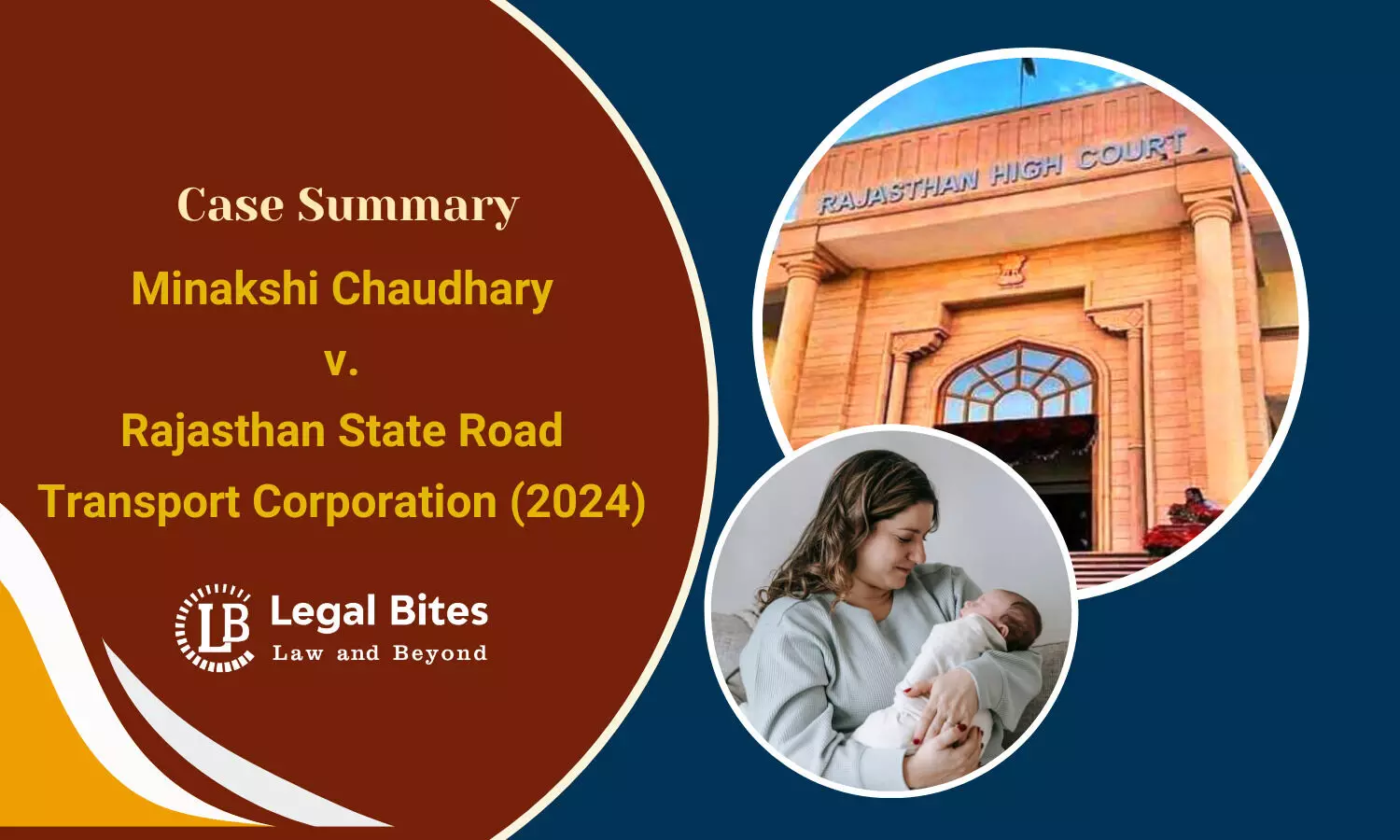Case Summary: Minakshi Chaudhary v. Rajasthan State Road Transport Corporation (2024) | 180 Days Maternity Leave for All Women Employees
The Rajasthan High Court emphasized that maternity leave is a fundamental right, beyond a statutory entitlement, protecting a woman's identity and dignity.;

By recognizing maternity leave as a right intrinsic to a woman’s identity, the ruling ensures that women in the workforce can balance their personal and professional roles without compromising their dignity or well-being.
Case Name: Minakshi Chaudhary v. Rajasthan State Road Transport Corporation
Court: High Court of Judicature for Rajasthan, Jaipur Bench
Case No.: S.B. Civil Writ Petition No. 15769/2016
Judgment Pronounced: 05/09/2024
Judge: Justice Anoop Kumar Dhand
Facts
Minakshi Chaudhary, employed as a conductor by the Rajasthan State Road Transport Corporation (RSRTC), became pregnant. She applied for 180 days of maternity leave under the Maternity Benefit (Amendment) Act, 2017. However, RSRTC only granted her 90 days of leave, citing their service regulations, specifically Regulation 74 of the RSRTC Employees Service Regulations, 1965, which provided for only 90 days of maternity leave.
The petitioner approached the court to seek an order directing the respondents to grant her the 180 days of maternity leave provided by the amended law. She argued that granting only 90 days of leave was discriminatory and violated her fundamental rights, especially when other female employees in similar government service situations were granted 180 days of leave.
Issues
- Whether the petitioner, an RSRTC employee, is entitled to 180 days of maternity leave under the Maternity Benefit (Amendment) Act, 2017.
- Whether the application of RSRTC’s Regulation 74, limiting maternity leave to 90 days, violates the fundamental rights of female employees under Articles 14 and 21 of the Indian Constitution.
Arguments of the Petitioner:
- The petitioner contended that she had applied for 180 days of maternity leave, in line with the Maternity Benefit (Amendment) Act, 2017, but was granted only 90 days, which was unjust.
- She argued that this treatment was discriminatory because, in other government departments, similarly situated employees were receiving 180 days of maternity leave. She emphasized that denying her the full benefit of maternity leave under the law violated her rights.
- The petitioner’s counsel referenced various judgments, including Laxmi Devi v. State of Rajasthan, Meenakshi Rao v. State of Rajasthan, and Reena Singla v. State of Punjab, where courts had ruled in favour of granting extended maternity leave in similar cases.
Arguments of the Respondents:
- The respondents argued that RSRTC was bound by its internal regulations, particularly Regulation 74 of the RSRTC Employees Service Regulations, 1965, which capped maternity leave at 90 days. They contended that no illegality had been committed since the petitioner had been granted the maximum leave allowed under these regulations.
- The respondents maintained that the petitioner was not entitled to 180 days of leave and that her claim should be rejected.
Court's Observations
- Maternity Leave as a Right: The court emphasized that maternity leave is a fundamental right essential for ensuring the health and well-being of both the mother and her newborn. It observed that maternity leave allows women to fulfill their reproductive roles without compromising their professional responsibilities. The court also highlighted that motherhood and maternity leave are critical components of a woman’s identity, and protecting these rights is crucial for ensuring social justice.
- Legal Provisions: The Maternity Benefit Act, 1961, as amended in 2017, extends maternity leave to 26 weeks (180 days) for women in certain sectors. RSRTC’s internal Regulation 74, which capped maternity leave at 90 days, was based on older provisions of the Act and had not been updated to reflect the 2017 amendments. The court found that RSRTC’s failure to update its regulations conflicted with the provisions of the Maternity Benefit (Amendment) Act, 2017.
- Judicial Precedents: The court cited several judgments, including Municipal Corporation of Delhi v. Female Workers (Muster Roll), which recognized the right to maternity benefits for all female workers, including those in the unorganized sector. The court also referred to Bandhua Mukti Morcha v. Union of India, where the Supreme Court recognized maternity relief as a fundamental right under Article 21 of the Constitution.
- Discrimination and Violation of Fundamental Rights: The court held that limiting maternity leave to 90 days for RSRTC employees, when other government employees were entitled to 180 days, amounted to discrimination. This violated Articles 14 (Right to Equality) and 21 (Right to Life) of the Indian Constitution. The court further noted that maternity leave is not only a statutory entitlement but also a fundamental right that reflects a woman’s dignity and identity.
Court's Decision
The court ruled in favour of the petitioner and directed RSRTC to grant her 180 days of maternity leave, in line with the Maternity Benefit (Amendment) Act, 2017. The court ordered RSRTC to adjust the 90 days of maternity leave already granted and to provide the petitioner with the remaining 90 days, along with any consequential benefits.
If granting the remaining 90 days of leave was not feasible due to the passage of time, the court ordered RSRTC to pay the petitioner 90 days’ salary as compensation. The court also suggested that RSRTC amend its outdated Regulation 74 to align with the Maternity Benefit (Amendment) Act, 2017.
Additionally, the court issued a general mandamus to the Government of India and the Government of Rajasthan, directing them to ensure that all unrecognized and private sector employers also provide 180 days of maternity leave to female employees.
Conclusion
The High Court's decision reinforced the importance of maternity leave as both a statutory entitlement and a fundamental right. By granting the petitioner 180 days of maternity leave and directing RSRTC to amend its regulations, the court ensured that women employees must be treated equally and provided the necessary support during their maternity period. This ruling supports the idea of social justice, ensuring that working women can manage both their jobs and motherhood without facing discrimination or financial difficulties.

